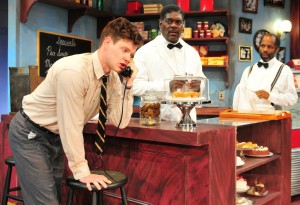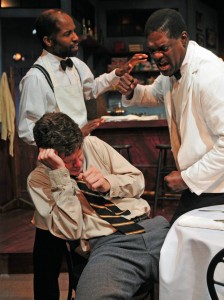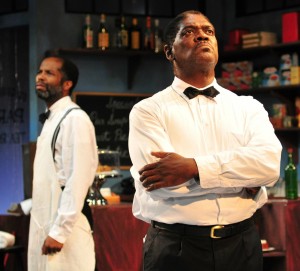Gloucester, Mass.
July 26 – August 12, 2012
By Athol Fugard
Directed by Benny Sato Ambush
Role: Sam

As Sam, listening with Willie (Anthony Wills, Jr.) while Hally (Peter Mark Kendall) receives a crushing phone call from his mother (PHOTO: Gary Ng)

Considering whether or not he should hit “Master Harold” (Peter Mark Kendall) for his increasingly cruel actions as Willie (Anthony Wills, Jr.) tries to mediate (PHOTO: Gary Ng)

Wounded and wondering if forgiveness and progress is possible, as Willie (Anthony Wills, Jr.) considers the events that just passed (PHOTO: Gary Ng)
“Johnny Lee Davenport is sensational as the powerful, charismatic Sam, with a performance incorporating charm, humor, rage and grief. Davenport is an imposing physical presence on stage, a fact that makes his confrontation with the fragile child of his employers all the more menacing as he struggles to contain his rage while Hally reverts to a little white boy hiding behind a chair.
sssssIn another scene, Davenport’s recreation of a dance competition he and his friend Willie enter every year is a storytelling adventure designed to lift Hally’s spirits and give him a topic for a college paper—since he can’t seem to come up with one on his own. Davenport is just wonderful in the long and colorful monologue during which Sam and Willie draw the depressed Hally into the magic and hope of this lively dance competition. Fugard’s dialog has Sam comparing the beauty and perfection of dance to the clumsy dance of life as lived by too many people—stepping on each other, bumping into each other, harming each other.
sssssWhen the serious Hally has trouble imagining this scenario at first, the exasperated Sam tells him, “Your imagination left out the excitement.” There is no excitement left out of Davenport’s masterful performance.
sssssAnthony Wills Jr. is animated and engaging as Willie, the other longtime employee of Hally’s parents. Wills, Jr. and Davenport have an easy onstage chemistry—the comfortable relationship of two longtime best friends.”
—Sally Applegate, wickedlocal.com (July 30, 2012)
“I urge everyone who loves the theatre, and is drawn to the deep complexities of human imperfections, attend this extraordinary production. The award-winning play, once banned in Apartheid-riddled South Africa, features outstanding performances by Johnny Lee Davenport, Peter Mark Kendall, and Anthony Wills, Jr. and is superbly directed by Benny Sato Ambush. This is an evening of stark emotion and complicated interactions . . . . In an hour and 45 minutes—with no intermission—through the use of humor, irony, and anger, the audience experiences the anguish of recognizing that entrenched racism has affected the special relationship these three men have had since the 17-year old white man was a boy. A sense of intractability is pervasive. Although, when, at curtain call, the three men embrace, there is relief!”
—Susan Hershey, Good Morning Gloucester (July 30, 2012)
“I am writing to you as an avid theatre-goer, who has seen almost every play performed at the Williamstown Theatre, Barrington Stage, Berkshire Theatre Festival, and Shakespeare and Co. this summer. I have season tickets to the Lyric Stage, and attend the ART and Huntington regularly.
sssssI drove up to Gloucester to see the performance of “Master Harold”. . . and the boys. . . This performance was beyond my expectations. The acting by these performers was so engaging and emotionally moving that I could not speak when it was over. . . .The love shown by Sam (Johnny Lee Davenport) towards Hally (Peter Mark Kendall) is so powerful that when it is challenged by hatred, you want the play to stop, only to be brought back by the unconditional love of Sam towards Hally, as he tries to help him on his journey to becoming a man. Johnny Lee Davenport and this small ensemble cast are some of the finest actors I have ever seen. Do not miss this play!!
sssssI feel that Johnny Lee Davenport is one of the most brilliant actors I have seen in any of the performances I have attended both this summer and in recent years. I have seen him at Shakespeare and Co. and at the Lyric Stage. I drove up to Gloucester to see this play in order to see his performance. It did not disappoint.”
—Rose Ann Berwald, Theater Mirror (July 30, 2012)
“The performances by the trio of actors are breathtaking for their courage to delve into the dark along with the light corners of the heart. . . .
sssssSam, a complex character is feelingly played by Johnny Lee Davenport who walks the tightrope balance of showing concern for the child who is hurting without becoming obsequious. He can be pushed only so far, however, by Hally, who threatens the relationship they have when the pressure of having his father come back into his life on a daily basis arises. Sam has his own rage to manage or not which we feel completely through Davenport’s performance. Davenport is also brilliant at recreating moments from the past so that we can see them vividly, most particularly the day he made a kite for Hally to fly and the ballroom dancing competition with the crowds, big band and its instruments, and the dancers taking the floor. . . .
sssssGloucester Stage’s emotionally gratifying production of “Master Harold” . . . and the boys will be remembered with the best of the past opportunities locally to see masters of the theater at work.”
—Kay Bourne, EDGE Boston (July 31, 2012)
“Johnny Lee Davenport’s deep voice reverberated throughout the theatre. His unbowed posture embodied the intensity of Sam, a man who has struggled to retain self-worth and dignity despite a lifetime under the cruelty of apartheid. Davenport’s performance demanded, and received, the audience’s rapt attention. This impressive actor deserves accolades for a remarkable performance.”
—nsfootlights, North Shore Footlights Blog (August 1, 2012)
“Johnny Lee Davenport brings dignity and passion to the role of Sam. It’s easy to see why, in 2011, Boston Magazine named Davenport Boston’s Best Actor.”
—Mark Sardella, “Columns and Essays” on Mark Sardella’s Blog (August 2, 2012)
“I went to the Gloucester Stage last night to see “Master Harold”…and the boys last night and it was outstanding, maybe the best thing I’ve seen at Gloucester Stage yet. The acting was exceptional—all three actors were terrific—and it’s a very complex and thought-provoking play. I totally recommend it . . . although not if you’re looking for something lite!”
—Amanda Nash, Good Morning Gloucester (August 2, 2012)
“Davenport, Wills, and Kendall could, however, put “Master Harold” across with no props at all. Davenport’s Sam starts out slow and contained and immersed in the comic books intended for Hally’s dad. He grows into a jovial exuberance, but everything about him is big, and that includes his rage and his sorrow; by the end he’s crying.”
—Jeffrey Gantz, Boston Globe (August 3, 2012)
“[The] devastating finale [is] brought off with harrowing grace by newcomer Peter Mark Kendall (who looks and sound just right as Harold) and especially local light Johnny Lee Davenport (as Sam), while on the sidelines, Anthony Wills, Jr., provides attentive, sensitive back-up as Willie. . . .
sssss[Of] course it’s always a pleasure to see Johnny Lee Davenport sink his teeth into a substantial part. Peter Mark Kendall paints a deadly-accurate portrait of young “Hally” – who is by turns touchingly vulnerable and hideously arrogant—but it’s the destruction of Sam’s dignity (especially in the context of his love for his callow employer) that is the backbone of the show, and at this climax Davenport is riveting. I’m really not sure why we haven’t seen this actor as Othello, or, to be honest, Lear—or in any number of classical roles. Perhaps our own staging conventions aren’t quite as far from those of 1950 Johannesburg as we’d like to imagine!”
—Thomas Garvey, The Hub Review (August 4, 2012)
“Anthony Wills, Jr. as Willie and Johnny Lee Davenport as Sam provide a lovely contrast to each other. Wills gives Willie a delightful sense of life and good-natured humor as he practices the ballroom steps. He also clearly plants Willie in a world of conventional expectations and actions.
sssssDavenport, on the other hand, gives Sam a gravitas and a willingness to challenge society’s boundaries. Davenport bursts with life as he describes the upcoming dance contest for Hally. And he’s got a great sense of humor as he dances with a circular table, in spite of Hally’s insistence that they stop horsing around.
sssssIf you’ve seen Davenport on stage before, you’re likely to suspect that a big emotional scene is coming. . . . He is absolutely explosive in a fiery confrontation with Hally, but he also clearly shows that by the end of the face-off he knows the danger and anguish he has caused himself, exquisitely illustrated as he lifts his feet one after another as if from hot coals.”
—David Brooks Andrews, Boston Theater Ink (August 5, 2012)
“Under Benny Sato Ambush’s delicate if fearless direction, the devolution of the companionable interaction among the three characters is a thing that first bubbles and then explodes, courtesy of an ensemble that’s as galvanic as the play. The trio of Johnny Lee Davenport, Anthony Wills Jr., and Peter Mark Kendall not only capture the distinctive, full-throttle personalities of their characters but also fold them into the infectious rhythms of South African speech.
sssssAs the playful Willie, Wills exudes spontaneity and boasts an accent that’s spot-on. As enthusiastic learner and subtle mentor Sam, a droll Davenport actually manages to have some fun—before the character is pushed beyond endurance — with Sam’s alleged subservience. And as the young Fugard stand-in, holding forth in his rumpled prep-school duds and youthful pretension, Brown/Trinity Rep conservatory student Kendall (whose family emigrated from South Africa) is a wrenching mix of ill-worn authority and cowering vulnerability. To hold one’s own against the frisky force of nature that is Davenport is no mean feat. And to borrow on the play’s ballroom metaphor, Kendall manages it with no left feet.”
—Carolyn Clay, The Boston Phoenix (August 6, 2012)
“The actors—Johnny Lee Davenport as Sam, Anthony Willis Jr. as Willie and Peter Mark Kendall as Hally, all in their Gloucester Stage debut performances—earned a prolonged standing ovation during their curtain call. . . .
sssssThe play rests squarely on the shoulders of Davenport’s Sam, a substitute father to Willie and Hally, is almost crushed by despair and rage at the change that comes over the white boy he has loved. Davenport’s performance is as heartfelt as his deep bass voice can make it, and Kendall and Willis play comic and dramatic riffs off his character’s wisdom and his growing anguish.
sssssThey make it the 2012 summer play that people will still remember in the summer of 2013.”
—Jack Butterworth, The Daily Item (August 3, 2012)
“Okay, I must say something here about “artistic size”: No matter how long they are, some plays (Macbeth) are really short-stories and some (Hamlet) are novels—depending on how much “life” is implied by the happenings in the play. And Athol Fugard’s masterpiece, though a one-act, is definitely a novel—and magnificently brought fully to life in this unearthly good production. . . .
sssssUnder Benny Sato Ambush’s flawless direction, the play takes the shape of life itself, as Willie (Anthony Wills, Jr.) and Sam (Johnny Lee Davenport) ready the rain-soaked shop for non-existent customers, and dream of Willie winning a ballroom-competition . . when “Hallie” [Peter Mark Kendall] arrives. . . . Metaphors and memories swim out of this emotional stew in this, what may be the last “naive” day of these people’s lives. The emotional carnage is riveting. Needless to say, the performances of this intense ensemble are textbook examples of perfection.”
—Larry Stark, Theater Mirror (August 5, 2012)
“Superlative veteran director Benny Sato Ambush’s powerful guidance and the three-man cast’s explosive acting dominate Athol Fugard’s masterful play, “Master Harold” . . . and the boys . . . .
sssssAward-winning actor Johnny Lee Davenport’s performance is so gut-wrenching and emotional, he took several minutes to compose himself during final bows.
Fugard’s play is emotionally and physically demanding of these outstanding performers—Davenport, and co-stars, Anthony Wills Jr., who portrays Willie, and Peter Mark Kendall, as the men’s troubled, white teen employer, Harold, affectionately nicknamed Hally. . . . Slowly, deliberately, tension rises, to a crashing crescendo, then ebbing to a melancholic finish. . . . Through indirect aggression, [Hally] transfers his hatred, disgust and disappointment for his father to Sam, erupting into a devastating showdown. . . . Fugard’s ending is heartbreakingly provocative. It leaves the audience gasping, weeping, rising to a standing ovation.”
—Sheila Barth, Theater Mirror (August 5, 2012)
Ambush’s lyrical production slowly builds (without you even knowing it) to a horrific crescendo when the boy either can rise above the whites only politics in South Africa or embrace apartheid and cast his friends aside. It’s a searing moment, made even more urgent by Davenport’s explosion of emotion, unleashing Sam’s hidden pain. Wills’ character seems as frightened as we are, sitting on the edge of our seats. And watching Kendall, cowering in a corner with Davenport looming above him, we see the powerlessness black Africans have felt for centuries. We feel Sam’s righteous rage and we hope against hope the boy will not make the wrong choice.
sssssThe intimacy of a small theater only adds to the immediacy of the story. Even if you saw “Master Harold” back in the day, Ambush’s version is a revelation. Do not miss it.
—Beverly Creasey, Boston Arts Review (August 7, 2012)
The very moving Gloucester Stage Company 30th anniversary revival—with a towering lead performance by Johnny Lee Davenport—demonstrates how truly universal Fugard’s messages remain. . . .
sssssThe sublime Gloucester Stage cast—all in debut with the company—make this “Master Harold” . . . and the boys even more touching than the very good Boston tours with the gifted James Earl Jones and the late Zakes Mokae.
sssssBest of all is Johnny Lee Davenport as Sam. This Boston-based dynamo is an actor of great range. Watch his light-heartedness and style as his Sam gives Willie pointers about a waltz and a foxtrot. Also note his subtlety and singular understatement as Sam tries to guide Harold to insight about manhood and friendship. Sam is unquestionably as much of a man of magnitude as the leaders and thinkers whom Harold considers for a history assignment and so is Davenport as an actor.
—Jules Becker, The Bay State Banner (August 9, 2012)
